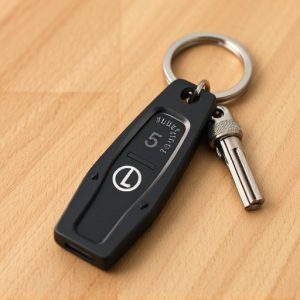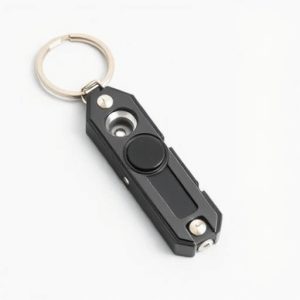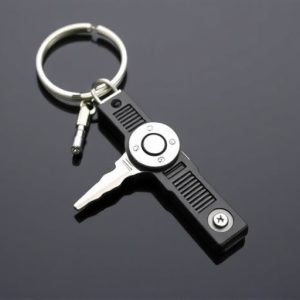Navigating State Laws: Legal Carry of Non-Lethal Keychain Weapons
In today's digital age, personal safety is paramount, and non-lethal keychain weapons are gaini…….
In today's digital age, personal safety is paramount, and non-lethal keychain weapons are gaining popularity for their portability. However, navigating state laws regarding these devices is crucial as legalities vary widely. Understanding your state's regulations on non-lethal keychain weapons like pepper spray or tasers is essential to ensure compliance, avoid legal issues, and have the protection you need. Safe carry practices include familiarization with the device, secure storage, and responsible handling. Following local guidelines, obtaining necessary permits, and staying informed through official sources are vital steps. Adhering to best practices ensures safe and legal use of non-lethal keychain weapons as a last resort for self-defense.
“In today’s world, personal safety is paramount, leading many to explore defensive keychain legal carry options. This comprehensive guide delves into the intricate web of state laws regarding non-lethal keychain weapons allowed. From understanding what constitutes a non-lethal weapon on a keychain to navigating permits and licenses, this article ensures you’re equipped with the knowledge for safe and legal carrying practices. Discover best practices tailored to defensive keychain weapons, empowering you to make informed decisions.”
- Understanding State Laws: Non-Lethal Keychain Weapons Legalities
- What Constitutes a Non-Lethal Weapon on a Keychain?
- Key Considerations for Safe and Legal Carry
- Navigating Permits and Licenses: Ensuring Compliance
- Best Practices for Carrying a Defensive Keychain Weapon
Understanding State Laws: Non-Lethal Keychain Weapons Legalities
Understanding State Laws: Non-Lethal Keychain Weapons Legalities
In today’s digital era, personal safety is a top concern for many individuals. One innovative solution gaining popularity are non-lethal keychain weapons—compact, easily portable devices designed to deter potential threats. However, navigating the legal landscape surrounding these tools can be challenging due to varying state regulations. To ensure compliance, it’s crucial to familiarize yourself with the specific laws in your jurisdiction regarding non-lethal keychain weapons allowed.
Each state has its own set of rules governing the carry and use of personal defense devices, including keychains armed with non-lethal force options like pepper spray or stun guns. Some states have liberalized their regulations, allowing open carry of such devices without a permit while others maintain stringent requirements, mandating permits or limited carry options. Understanding these legalities is essential to not only protect yourself but also avoid any potential legal repercussions.
What Constitutes a Non-Lethal Weapon on a Keychain?
When we talk about non-lethal weapons on a keychain, it’s essential to clarify what is considered legal and safe. In many states, a non-lethal weapon is defined as a device designed to incapacitate or deter an attacker temporarily without causing permanent harm. This typically includes items like pepper spray, tasers (in some jurisdictions), and stun guns. These tools are often compact enough to fit on keychains, making them convenient for personal protection.
The term ‘non-lethal’ is used because these weapons aim to disable or disrupt an aggressor’s actions without ending in fatal consequences. For instance, pepper spray irritates the eyes and respiratory system, providing a chance to escape or deter an attack. Similarly, stun guns deliver an electric shock, causing muscle paralysis for a brief period. It’s crucial to understand that while these keychain weapons are allowed, their use is subject to local laws and regulations, which can vary widely between states.
Key Considerations for Safe and Legal Carry
When considering carrying a defensive keychain for personal safety, understanding local laws and regulations is paramount. Each state has its own guidelines on what constitutes legal self-defense and carry permissions, with some allowing non-lethal keychain weapons like pepper spray or tasers. It’s crucial to check your area’s specific rules regarding size, capacity, and restrictions on such devices.
Safe carry practices should always be prioritized. This includes familiarizing yourself with the operation of your chosen device before any potential need arises, storing it securely in a case or pouch when not in use, and ensuring it remains easily accessible yet discreet during everyday activities. Remember, responsible ownership and handling are key to legal and safe defensive keychain carry.
Navigating Permits and Licenses: Ensuring Compliance
Navigating Permits and Licenses is a crucial step for individuals looking to legally carry a defensive keychain weapon, ensuring compliance with local laws and regulations. The first consideration is understanding which types of non-lethal keychain weapons are allowed in your state or region. While many permit self-defense tools like pepper spray or tactical flashlights, specific rules vary widely. It’s essential to research and adhere to these guidelines, as carrying an unauthorized device could lead to legal consequences.
To remain compliant, check with your local law enforcement agency or government website for up-to-date information on permits and licenses required for non-lethal keychain weapons. Many areas mandate a permit application process that includes background checks and training certifications. Keeping abreast of these requirements ensures you’re not only following the letter of the law but also enhancing your personal safety by making informed decisions regarding self-defense options.
Best Practices for Carrying a Defensive Keychain Weapon
When carrying a defensive keychain weapon, adherence to best practices is essential for safety and legality. Always ensure that your state laws permit the non-lethal keychain weapons you intend to carry. Check local regulations regarding concealed carry permits or licenses, as some areas may have stricter rules. Keep in mind that while these weapons are designed for self-defense, they should be used responsibly and only as a last resort.
Best practices include keeping your weapon easily accessible yet secure, ensuring the device is properly charged, and regularly testing its functionality. Practice safe handling procedures and store your keychain defense tool out of reach of children and unauthorized individuals. Remember to familiarize yourself with de-escalation techniques, as the goal should always be to resolve a situation without causing harm, unless absolutely necessary.
In conclusion, understanding your state’s laws regarding non-lethal keychain weapons is crucial for ensuring both legality and safety. With proper knowledge of what constitutes a non-lethal weapon on a keychain and key considerations for carry, you can navigate permits and licenses effectively. By adhering to best practices for carrying a defensive keychain weapon, folks can protect themselves while respecting the legal guidelines allowed in their states.


